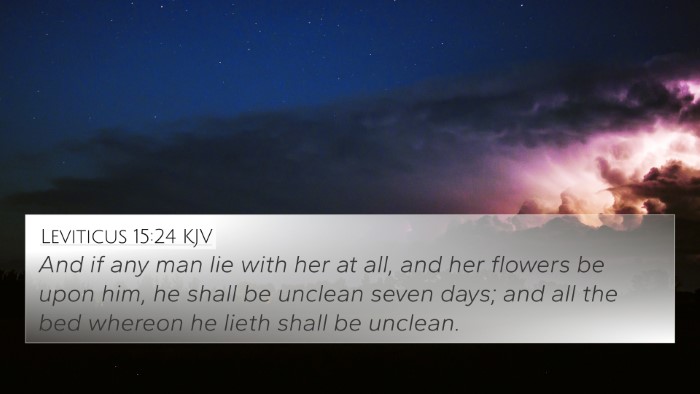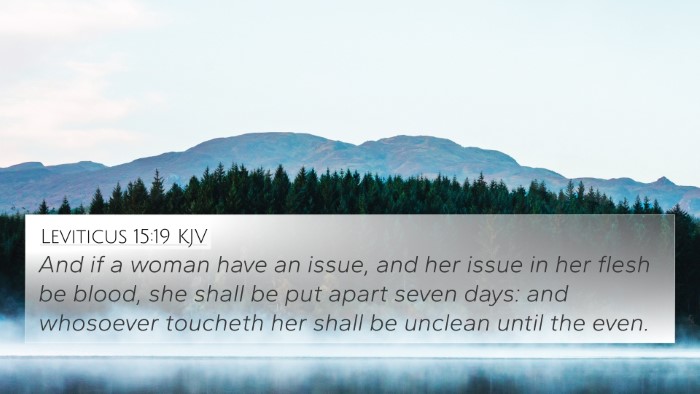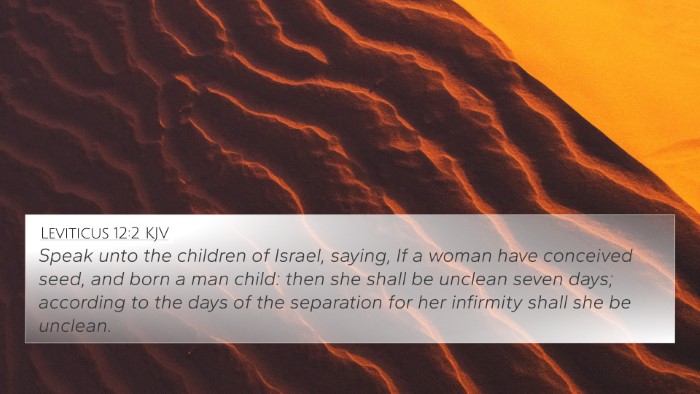Understanding Leviticus 18:19
Leviticus 18:19 states:
"You shall not approach a woman to uncover her nakedness as long as she is in her menstrual uncleanness."
This verse is part of a broader set of laws given to the Israelites regarding sexual conduct and purity. It emphasizes the importance of ritual cleanliness in the community, particularly concerning the intimacy between husband and wife during a woman's menstrual period.
Commentary Insights
Matthew Henry
Matthew Henry highlights the intention behind the prohibition, suggesting it stems from a divine concern for the believers' purity and the sanctity of marital relations. He emphasizes that this regulation not only protects the physical well-being of the woman but also maintains spiritual integrity within the community.
Albert Barnes
Albert Barnes elaborates on the cultural context, pointing out that many surrounding nations had different customs regarding women’s menstrual periods. He notes that the Israelites were called to be distinct in their practices, promoting a holy lifestyle that honored God's commandments. He stresses the importance of obedience to these laws for maintaining a relationship with God.
Adam Clarke
Adam Clarke provides a scholarly perspective, examining the historical and theological implications of the verse. He suggests that the command covers not only physical actions but also the attitudes of purity and respect that should permeate marital relations. Clarke underscores the spiritual symbolism of such laws, which point to greater truths regarding holiness and moral behavior.
Cross-References and Connections
Leviticus 18:19 has several important cross-references that provide a more comprehensive understanding of its themes:
- Leviticus 15:19-30 - Discusses the laws of purity and the implications of menstrual uncleanness.
- Exodus 19:10-15 - God commands the people of Israel to consecrate themselves to approach Him, establishing the principle of purity before fellowship.
- 1 Corinthians 7:5 - Discusses the idea of intimacy in marriage, connected with mutual consent and understanding of God’s commandments regarding purity.
- Hebrews 13:4 - Highlights the honor of marriage and the necessity of keeping the marriage bed undefiled, connecting with the themes of purity.
- Leviticus 20:18 - Reinforces the prohibitions against sexual conduct during a woman's menstrual period, outlining the consequences faced for disobedience.
- Deuteronomy 23:10-11 - Relates to laws of uncleanness and the treatment of those who are impure, echoing the themes in Leviticus.
- Matthew 5:28 - Jesus addresses the internal motivations of the heart, reinforcing the need for purity that transcends merely external laws.
Conclusion
Leviticus 18:19 serves as a vital instruction for the Israelites, focusing on both physical and spiritual purity. It calls believers to engage in practices that foster holiness and respect within their relationships. Understanding this verse requires awareness of its context, implications, and connections with other scripture. This promotes a holistic view of biblical law that extends into principles of spiritual integrity and relational respect.








